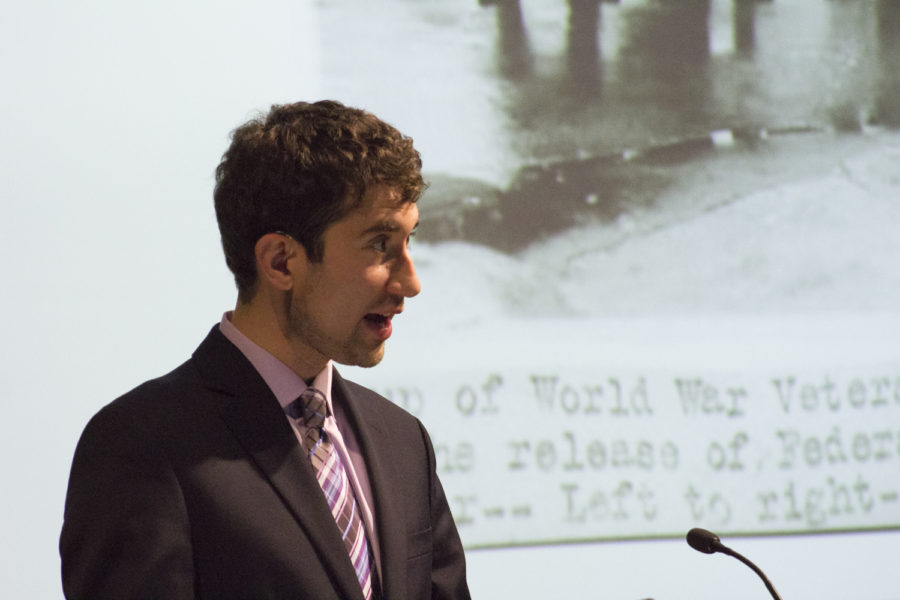Eric Schmalz presents Midwestern Perspective on Anti-Semitism at the Ames Public Library
Kennedy DeRaedt/Iowa State Daily
Eric Schmalz, community manager for the “History Unfolded” project at the United States Holocaust Memorial Museum, speaks at the Ames Public Library on Nov. 5. Schmalz talked about the cultural landscape of America, how the newspapers reported and how Americans reacted during the 1930s and 1940s. “America’s restrictive immigration laws in the 1920s, were a reaction to the national climate of isolationism, xenophobia, antisemitism, racism, and economic insecurity,“ Schmalz said.
November 5, 2018
Eric Schmalz, community manger for the History Unfolded project at the Holocaust Memorial Museum in Washington D.C, presented “The Gauntlet Has Been Thrown: Newspapers, Op-eds, and American Responses to Anti-Semitism” Monday night at the Ames Public Library, exposing audience members to the historical narrative in Midwestern newspaper coverage of the Holocaust.
Schmalz is a community manger for the History Unfolded project at the Holocaust Memorial Museum in Washington D.C., and was sponsored for this presentation by the Ames Public Library, the Greenlee School of Journalism and Mass Communication, and the Ames Historical Society. The event was filled to capacity at 196 attendees.
Jeremy Best, a member of the Iowa State history department, covered recent events in Pittsburgh, Pennsylvania as a opening for the presentation.
“The history of the Holocaust is in fact American history,” Best said.
Eric Schmalz introduced the lecture by explaining the History Unfolded project. The Holocaust has received over 20,000 newspaper submissions, further adding to the organizations success and impact in understanding the American standpoint regarding violence against Jews.
Schmalz still encourages people to contribute time to further knowledge and archive content for future documentation.
“This project is actually very valuable,” Schmalz said. “We’re still just scratching the surface.”
Visitors were encouraged to visit the Holocaust Memorial Museum’s website at www. ushmm.org/learn/history-unfolded.
Despite the sacrifices made for the second world war, Americans were not completely sympathetic with those of unfortunate circumstances. Three major figures were the focus of Schmalz’s presentation, as well as America’s reactions to their public statements.
While Henry Ford, a successful businessman and inventor, may not be remembered as Anti-Semitic, Ford actually organized a seven year hate campaign against people of the Jewish faith. Though Ford apologized to the public, he continued to embrace Anti-Semitic views. Ford additionally accepted a German award, much to the protest of the general public. Though Ford was given opportunities to renounce his beliefs, specific instances were not always completely sincere explained Schmalz. Some chose to ignore these statements of Ford, possibly even “spin” newspaper content, said Schmalz.
Charles Coughlin, explained Schmalz, was another public figure who frequently targeted members of the Jewish faith. The Detroit News featured letters on Father Coughlin’s radio talk, as well as additional newspapers in Iowa and the surrounding Midwest. The Des Moines Register agreed with the Daily Freeman journal that Coughlin had the freedom to speak his opinion, no matter how horrible his statements, said Schmalz. To suppress his speech would make them no better. The Iowa Jewish Press, a Des Moines paper, pointedly noted how the only way for Coughlin to draw dramatic attention to his speeches was through anti-Semitism.
The America First Committee, supported by both parties, was endorsed by Charles Lindbergh, an American aviator during the mid-1900s. Despite efforts, the group gathered far-right members. Schmalz explained Lynberg’s role with the American First Committee, where he explicitly condemned the British, the Jewish, and the Roosevelt Administration.
Newspapers in the Midwest did not take Lynberg’s accusations lightly claimed Schmalz. “The prevailing attitude and response was decidedly negative,” said Schmalz.
Reactions were strong throughout the country, condemning Lynberg’s ideas. The Marshalltown Times was an outlier in this, further perpetuating stereotypes. Some editiorials even regarded his speech as silly and nonthreatening, explained Schmalz. “In some cases the writers own Anti-semitism became just as apparent,” said Schmalz. Iowans themselves even raised their opinions in letters to the Des Moines Register.
Schmalz finished his presentation explaining how Americans were not as oblivious as modern myths portray. But still, Americans should advocate for democracy and free speech. Journalism was vital during the Holocaust, and it is still relevant today.







